【配套K12】[学习]八年级英语上册 Module 7 A famous story知识点归纳总结
外研版八年级英语上册教案 Module 7 A famous story
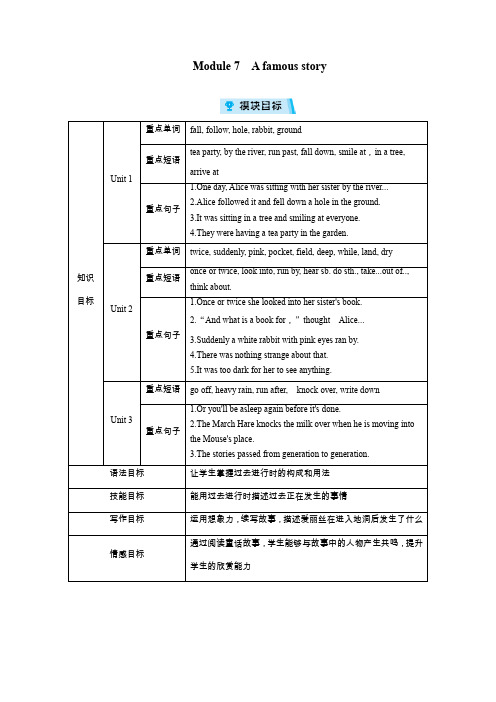
知识目标
Unit 1
重点单词
fall, follow, hole, rabbit, ground
重点短语
tea party, by the river, run past, fall down, smile at,in a tree, arrive at
重点句子
5.It was too dark for her to see anything.
Unit 3
重点短语
go off, heavy rain, run after, knock over, write down
重点句子
1.Or you'll be asleep again before it's done.
技能目标
能用过去进行时描述过去正在发生的事情
写作目标
运用想象力,续写故事,描述爱丽丝在进入地洞后发生了什么
情感目标
通过阅读童话故事,学生能够与故事中的人物产生共鸣,提升学生的欣赏能力
重点句子
1.Once or twice she looked into her sister's book.
2.“And what is a book for,”thought Alice...
3.Suddenly a white rabbit with pink eyes ran by.
4.There was nothing strange about that.
1.One day,Alicewas sitting with her sister by the river...
2.Alicefollowed it and fed.
八年级英语上册 Module 7 A famous story Unit 2 She was th
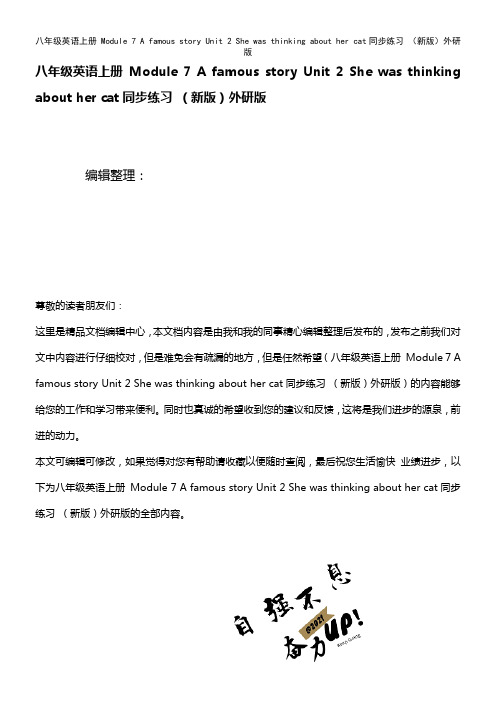
八年级英语上册Module 7 A famous story Unit 2 She was thinking about her cat同步练习(新版)外研版编辑整理:尊敬的读者朋友们:这里是精品文档编辑中心,本文档内容是由我和我的同事精心编辑整理后发布的,发布之前我们对文中内容进行仔细校对,但是难免会有疏漏的地方,但是任然希望(八年级英语上册Module 7 A famous story Unit 2 She was thinking about her cat同步练习(新版)外研版)的内容能够给您的工作和学习带来便利。
同时也真诚的希望收到您的建议和反馈,这将是我们进步的源泉,前进的动力。
本文可编辑可修改,如果觉得对您有帮助请收藏以便随时查阅,最后祝您生活愉快业绩进步,以下为八年级英语上册Module 7 A famous story Unit 2 She was thinking about her cat同步练习(新版)外研版的全部内容。
Module 7 A famous story Unit 2 She was thinking about her cat Ⅰ。
从方框中选择适当的单词并用其正确形式填空错误!1.-Which sweater would you like,Lily?-I like the ______ one.2.The farmers work day and night in the ______ to get a good harvest (收成).3.There is ______ in the fridge.We'd better go and buy some。
4.Suddenly a cat ran ______ me.5.—What's in your ______,T ony?-Oh,it is a pen which I bought this morning.6.I go to the library ______ a week。
【名师推荐资料】八年级英语上册 Module 7 A famous story知识点归纳总结 (新版)外研版
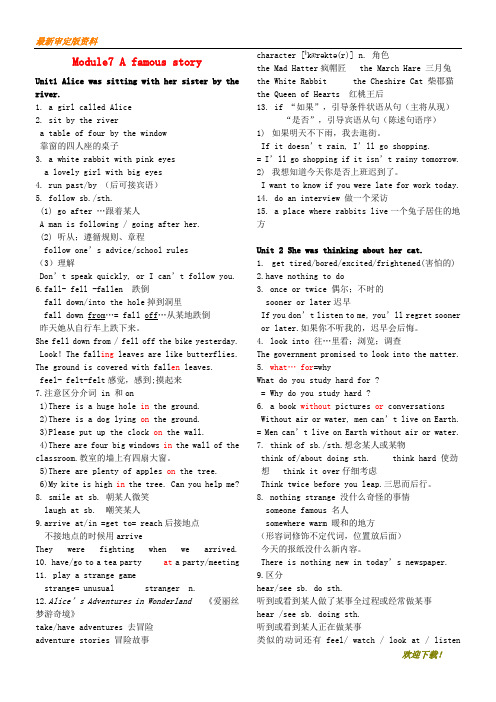
Module7 A famous storyUnit1 Alice was sitting with her sister by the river. 1. a girl called Alice 2. sit by the river a table of four by the window 靠窗的四人座的桌子 3. a white rabbit with pink eyes a lovely girl with big eyes 4. run past/by (后可接宾语) 5. follow sb./sth. (1) go after …跟着某人 A man is following / going after her. (2) 听从;遵循规则、章程 follow one’s advice/school rules (3)理解 Don’t speak quickly, or I can’t follow you. 6.fall- fell -fallen 跌倒 fall down/into the hole 掉到洞里 fall down from …= fall off …从某地跌倒 昨天她从自行车上跌下来。
She fell down from / fell off the bike yesterday. Look !The fall ing leaves are like butterflies. The ground is covered with fall en leaves. feel- felt-felt 感觉,感到;摸起来 7.注意区分介词 in 和on 1)There is a huge hole in the ground. 2)There is a dog lying on the ground. 3)Please put up the clock on the wall. 4)There are four big windows in the wall of the classroom.教室的墙上有四扇大窗。
外研版八年级英语上册Module 7 A famous story单元知识点归纳
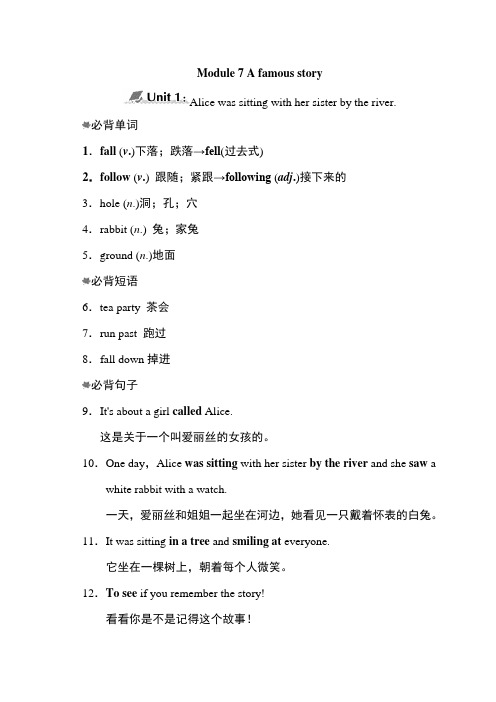
Module 7 A famous storyAlice was sitting with her sister by the river.必背单词1.fall (v.)下落;跌落→fell(过去式)2.follow (v.)跟随;紧跟→following (adj.)接下来的3.hole (n.)洞;孔;穴4.rabbit (n.) 兔;家兔5.ground (n.)地面必背短语6.tea party 茶会7.run past 跑过8.fall down掉进必背句子9.It's about a girl called Alice.这是关于一个叫爱丽丝的女孩的。
10.One day,Alice was sitting with her sister by the river and she saw a white rabbit with a watch.一天,爱丽丝和姐姐一起坐在河边,她看见一只戴着怀表的白兔。
11.It was sitting in a tree and smiling at everyone.它坐在一棵树上,朝着每个人微笑。
12.To see if you remember the story!看看你是不是记得这个故事!She was thinking about her cat.必背单词1.suddenly (adv.)突然地;出乎意料地→sudden(adj.)突然的2.deep (adj.)深的→deeper(比较级)更深的3.while (conj.)当……的时候→ when(同义词)4.dry (adj.)干的;干燥的→drier(比较级)→driest(最高级) 5.twice(adv.)两次;两倍6.pink (adj.)粉红色的;(n.)粉红色7.pocket (n.)衣袋;口袋8.field (n.)牧场;田地9.land (v.)降落(或跳落,跌落)到地面(或水面上)必背短语10.once or twice 偶尔;一两次11.think about 考虑12.run by 跑过必背句子13.Alice had nothing to do.爱丽丝没有什么事可做。
初中英语外研版八年级上册《Module 7 A famous story Unit 2 She w
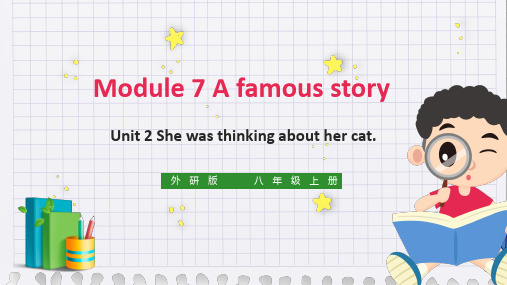
Reading task Read the para 3 and finish the following tasks.
Then Alice went down after it , but never
6
5 thought about how she was going to get out
again. she found that she was falling down a very,
Alice’s sister 1. Alice was reading a book.
F
2. The book had a lotnoof pictures in it.
F
3. The white rabbit was looking at a
T
watch.
4. The rabbit went down a rabbit hole
Where 2. across the field 3. in a rabbit hole
Who Alice, her sister and a rabbit
What Alice saw a rabbit and fell down a hole after it.
Reading task Read and check with T or F.
1 Was Alice interested in her sister’s book? How do you know? No, she wasn’t.Because in the story Alice thought “… what is a book for without pictures or conversations?”
Reading task Read the para 2 and finish the following tasks.
八年级英语上册《Module 7 A famous story Unit 1 Alice was s
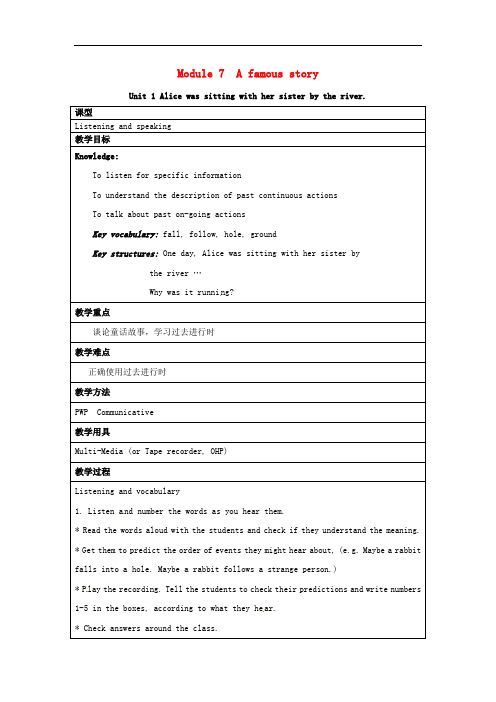
Module 7 A famous storyUnit 1 Alice was sitting with her sister by the river.课型Listening and speaking教学目标Knowledge:To listen for specific informationTo understand the description of past continuous actionsTo talk about past on-going actionsKey vocabulary: fall, follow, hole, groundKey structures: One day, Alice was sitting with her sister bythe river …Why was it runni ng?教学重点谈论童话故事,学习过去进行时教学难点正确使用过去进行时教学方法PWP Communicative教学用具Multi-Media (or Tape recorder, OHP)教学过程Listening and vocabulary1. Listen a nd number the words as you hear them.* Read the words aloud with the students and check if they understand the meaning. * Get them to predict the order of events they might hear about, (e.g. Maybe a rabbit falls into a hole. Maybe a rabbit follows a strange person.)* P lay the recording. Tell the students to check their predictions and write numbers 1-5 in the boxes, according to what they he ar.* Check answers around the class.2. Listen again and number the pictures.* Read the simple descriptions of the pictures with the students. Explain the names in the descriptions if necessary, (e.g. In March, hares---wild rabbits---are considered mad because of their strange behaviour when they try to attract female rabbits, so there is an expression in English "He's as mad as a March hare.") * Repeat the descriptions, especially the names, chorally for the students' pronunciation.* Put the students into pairs or groups of three to describe the pictures.* Elicit descriptions from the class.* Play the recording and ask the students to listen for the descriptions.* Play the recording again for them to number the pictures and check answers in pairs or groups.* Play the recording once more for the students to check and then elicit their answers in order.3. Listen and read.* Divide the students into groups. Then elicit the new language by telling different groups to mime such actions as eating a sandwich, drinking tea, combing hair, reading a book, drawing a picture, looking at watches, etc and continue doing them until they hear "stop".* Shout "stop". Ask the students what they were doing a minute ago:Teacher: What were you doing when I shouted "stop"?Students: We were eating sandwiches.* Ask different groups to elicit different responses.* Have the students ask each other in open pairs.* Ask the students if they know about the story of Alice's Adventures in Wonderland. If they do, elicit what they have understood and use it to teach the key vocabulary. If they don't, give a br ief introduction to the story.* Play the recording. Tell the students to read the conversation as they listen. Now complete the notes.* Ask the students to look at the notes and guess the missing information.* Ask them to read the conversation again and underline the key information to help them complete th e notes.* Ask them to comple te the notes individually.* Elicit answers in full sentences from the whole class.Extension* Play the recording again, pausing after each sentence and having the students repeat them chorally and individually. Otherwise, simply ask them to work in pairs and read the conversation.* Have them practise it and change roles. Circulate and monitor their production. * Ask some volunteers to perform the conversation for the class.4. Complete the sentences with the words in* Look at the words in the box with the class. Make sure the students are clear about the meaning.* Ask the students to read the sentences on their own and guess what the missing words are.* Ask them to complete the sentences individually and check their answers in pairs. * Elicit answers in full sentences.Pronunciation and speaking5. Listen and underline the words the speaker stresses.* Ask the students to read the conversations and predict the stress.* Play the r ecording and pause for the students to repeat for pronunciation and stress.* Play the recording again and tell the stude nts to listen and repeat. Then ask them to underline the stressed words.* Play the reco rding once more. Elicit the stress and let the students check whether their prediction was correct.Now work in pairs. Listen again and repeat.* Play the recording a nd have the students read out the conversations in pairs asthey listen. Tell them to exaggerate the stressed words.Nominate a few pairs to read the conversations.6. Work in pairs. Do an interview.* Read the instructions and model conversation with the class. Make sure they are clear about what they are going to do.* Tell the students to do an interview in pairs after the example and say what they were really doing then.* Do a few conversations in open pairs first to pick up any errors.* Circulate and monitor their progress.* Have some students present their interviews in open pairs.。
八年级英语上册 Module 7 A famous story模块教案 (新版)外研版

4. Introduce the new words.
5. Learn the new words.
6. Read the new words.
Step 2Listening practice.
B.交际用语:
1. Ssh!
2. Sorry!
3. —What’
4. Why was it running?
5. Alice was sitting with her sister by the river.
6. It was sitting in a tree and was smiling at everyone.
4. Play the recording again and ask the whole class to check with a partner.
5. Check the answers:
Step 3 Listening practice.
1. Ask the students to look at the pictures and read through the sentences in Activity 2.
7. They were having a tea party in the garden.
8. She was playing a strange game!
9. Where was it going?
10. To see if you remember the story!
11.—The Cheshire Cat was sitting on the grass.
八年级英语上册 Module 7 A famous story Unit 1 Alice was s
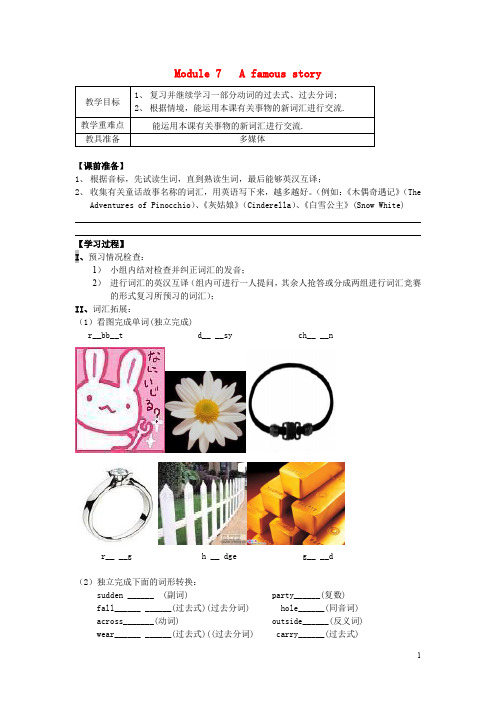
Module 7 A famous story【课前准备】1、根据音标,先试读生词,直到熟读生词,最后能够英汉互译;2、收集有关童话故事名称的词汇,用英语写下来,越多越好。
(例如:《木偶奇遇记》(TheAdventures of Pinocchio)、《灰姑娘》(Cinderella)、《白雪公主》(Snow White)【学习过程】I、预习情况检查:1)小组内结对检查并纠正词汇的发音;2)进行词汇的英汉互译(组内可进行一人提问,其余人抢答或分成两组进行词汇竞赛的形式复习所预习的词汇);II、词汇拓展:(1)看图完成单词(独立完成)r__bb__t d__ __sy ch__ __nr__ __g h __ dge g__ __d(2)独立完成下面的词形转换:sudden ______ (副词) party______(复数)fall______ ______(过去式)(过去分词) hole______(同音词)across_______(动词) outside______(反义词)wear______ ______(过去式)((过去分词) carry______(过去式)(3)组内交流答案,改正错误并记忆。
III、当堂反馈练习:根据首字母提示,完成句子。
1. Don’t go a______ the street when the traffic light is red.2. What do you do with a s man who enters your home at night?3.D______ the summer holiday, I did my homework and visited my grandparents.4. Which color do you prefer, the black or the p______?5. Look! The farmers are working in the f______?6.Can you help me? The bag is so heavy. I ca n’t c______ it.7.A:Tom f______ off his bike and hurt his leg yesterday.8.You can’t stand u______ the tree when it rains heavily.9.I felt very t______ after the long walk.10.Lucy j______ higher than Lily.【课前准备】课前朗读本模块的词汇(学生自己朗读)【学习过程】I、新知导入。
[配套K12]2016年秋八年级英语上册 Module 7 A famous story主题阅读 (
![[配套K12]2016年秋八年级英语上册 Module 7 A famous story主题阅读 (](https://img.taocdn.com/s3/m/0c6801da9b89680202d8252b.png)
Module 7主题阅读Ⅰ. 阅读理解AA man went to a fast-food restaurant to buy his lunch. “Hi,” a worker said.“May I help you?”“I'd like a hamburger, large chips, and a Coke,” the man said.“Anything else?” the worker asked.“No,” the man answered.”That's it.”“Is that for here or to go?” The worker asked.“To go,” the man said.The worker put the man's lunch in a bag. The man took out his money and paid for his lunch.“Thank you,” the worker said. “Have a nice day.”The man took the bag and walked to a park. He sat down and opened the bag. He was surprised. There was no hamburger in the bag. There were no chips. There was no Coke. There was only money in the bag—a lot of money! The man counted the money. Two thousand dollars! Why was the money in the bag? Where was the man's lunch?The manager of the fast-food restaurant needed to go to the bank. He put two thousand dollars in an envelope (信封). He put the envelope in a bag and put the bag down. The worker gave the manager's bag to the man by mistake. So the manager had a hamburger, chips and a Coke, and the man had two thousand dollars. What should the man do?.()1. The man went to a restaurant to __________.A. buy his lunchB. have a restC. sell drinksD. cook food()2.The man wanted to have his lunch __________.A. in a hotelB. in a shopC. in a restaurantD. in a park()3. When the man opened the bag, he found __________ in it.A. foodB. drinkC. moneyD. nothing()4._________ couldn't find his money.A. The manB. The managerC. The workerD. Nobody()5. Where was the man’s lunch?A. in the bankB. in the restaurantC. in the man’s handD. in an envelopeBHaving Fun “Growing” and “Stealing”?An Internet game has become a new fashion among young office workers and students. People can “farm”on a piece of land and “grow”, “sell”or even “steal” vegetables,flowers. And fruit on the net. They can earn some e-money and buy more seeds, pets and even houses. Huang Lin interviewed some young people. Here are their opinions.Wang Hua:I don't quite understand why they are so mad about the childish game. Maybe they are just not confident enough to face the real world.Zhang Ming: I enjoy putting some bugs in my friends’ gardens and we’ve become closer because of the game. Having fun together is the most exciting thing about it.Li Ming: You know, people in the city are longing for(渴望) the life in the countryside. It reduces my work pressure(压力); besides, it gives me the exciting experience of being a thief.Zhou Xiao Jun: Well. It’s just a waste of time. Teenagers playing the game spend so many hours on it that they can not focus on (专注于)their study.( )6. According to the passage, peoplecan’t _______thing s in this game.A. growB. borrowC. stealD. sell( )7. Among the people Huang Lin interviewed, _______ likes the game while_______ dislikes the game.A. Li Ming; Zhang MingB. Zhang Ming; Wang HuaC. Li Ming; Zhou Xiao JunD. Zhou Xiao Jun; Zhang Ming( )8. From Li Ming’s words, we can guess that he’s most probably_________A. a studentB. an office workerC. a farmerD. a thief( )9. Which is NOT the reason why peoplelike the game?A. They are longing for country life.B. They can have fun with friends.C. The game can relax people and give them a new experience.D. They are confident enough to face the real world.( )10. here can you find this passage?A. In a car magazine.B. In an advertisement.C. In a newspaper.D. In a science book.Ⅱ. 完形填空An old man has a cat. The cat now is very old. She can’t run quickly, and she can’t bite 1 .One day the old cat saw a mouse, she jumped and 2 it. But she couldn’t bite it. So the mouse got out of her 3 and ran away. The old man got very 4 and beat the cat. The cat said to him. “Don’t beat your servant. Don’t be unkind to the 5 .When they are young, they can do good work.”()1. A. too B. also C. either()2. A. catch B. caught C. catches()3. A. mouth B. eyes C. hands()4. A. sad B. satisfied C. angry()5. A. young B. old C. sickModule 7主题阅读Ⅰ. A 1.A 2. D 3. C 4.B 5.AB 6. B 本题属于细节考查。
[配套K12]2016年秋八年级英语上册 Module 7 A famous story Unit
![[配套K12]2016年秋八年级英语上册 Module 7 A famous story Unit](https://img.taocdn.com/s3/m/e7c1723352ea551811a68719.png)
Module 7 Unit 3Language goals 语言目标1. Key vocabulary 重点词汇tired, nothing, twice, conversation, suddenly, pink, by, pocket, across, field 2. Key structures 重点句式... was/were doing...Ability goals 能力目标Enable students to read and write about fairy tales.Teaching methods 教学方法Top-down approachTeaching aids 教具准备Tape recorder, OHP, multi-mediaTeaching procedures and ways 教学过程与方式Step 1. Lead-inReview past on-goings through asking and answering questions; encourage them to recall the characters in the story Alice's adventures in wonderland and lead in new lesson.T: Hello, boys and girls. What were you doing this time yesterday?S: We were having an English lesson.T: What did we learn yesterday?S: We learned to use past on-goings.T: Which story were we talking about?S: Alice's adventure in Wonderland.T: Good. Do you remember the characters in the story?S: Yes. The mad hatter and the march hare, the white rabbit, the red king, the red queen and AliceT: Great. Now let's look at the picture on page 44 please. Who's in the picture?S: It's a rabbitT: Do you think it is strange?S: Yes. It's wearing clothes.T: Yes, that's the point. Usually rabbits don't wear clothes. Is there anything else strange?S: It is carrying a stick. It is standing on its back legs. It's looking at a watch. T: Good. Why is it so strange? Today let's learn more about Alice's adventures in wonderland.Step 2. ReadingIn this procedure, students will read the start of Alice's adventure in Wonderland and answer the questions to learn more about the details of the story: what, who, when, where and why.Learn the following new words.tired, nothing, twice, conversation, suddenly, across, pocketAnd then ask students to read individually and discuss the questions with a partner. Check the answers. Ask them to read again and decide whether the following sentences are true or false.1. Alice was reading a book.2. The book had a lot of pictures in it.3. Alice wanted to make daisy chain.4. A white rabbit ran past Alice and her sister.5. The rabbit was wearing clothes.6. The rabbit went into a hole under a big tree.7. Alice entered the hole after the rabbit.Check the answers.Step 3. WritingIn this step, students will do the match work first to know something about Lewis Carroll. Introduce more about Lewis Carroll to them and then ask them to write the story of Lewis Carroll and Alice LiddellT: Last period, I asked you to find some information about the writer of the story, have you finished?S: Yes.T: Can you tell me who the writer is?S: Lewis Carroll.T: Good. Today let's learn more about the writer. Let's learn why and how he wrote this story?Ask students to read the questions and answers fast, make sure they understand each one, and then let them do the match work.Step 4. PractisingExplain the difference between the past simple tense and past continuous.Show the following.1. He ________ (see) a film last night.2. They ____________ (cook) at 8 o'clock yesterday.3. When I _________ (see) her two hours ago, she __________(talk) to somebody.4. A: What ________ you ________ (do) at this time last week?B: I ______________(prepare) for the maths test.5. When the policemen came, the boys _____________ (cry) loudly.6. Last summer, we __________ (work) on a farm.7. When the electricity went off yesterday, the girls ____________(have) dinner.8. He often _________ (swim) when he was young.Step 5. Homework1) Ask students to make sentences with the phrases: once or twice, look into, what...for..., be doing...when..., think of, grow up, have a picnic.2) Do activities 5-6 in the workbook.。
推荐学习K12八年级英语上册 Module 7 A famous story Unit 3 Lang

________ ________ ________ _________ go down a hole just now?
【题组训练三】
Aliceate the cake. She began to grow. She grew bigger and bigger.Alicebegan to26. Her tears (眼泪) fell down onto the27.
3.They __________(run) in the playground at half past six this morning.
4.Mike and Betty ________(go) to thePalaceMuseumby bus just now.
5.Yesterday afteБайду номын сангаасnoon they ________(leave) the farm.
Aliceis a beautiful girl ________ ________ __________.
4.They were playing football at 4 pm yesterday.(改为一般疑问句)
_______ ______playing football at 4 pm yesterday?
( )34. A. bigger B. older C.smaller D. younger
( )35. A. rabbit B. cat C. mouse D. monster
一、根据句意用括号内所给动词的适当形式填空。
1. Mike _________(play) a new computer game at ten o'clock last night.
新外研版八年级上册Module_7_A_famous_story知识点(K12教育文档)

新外研版八年级上册Module_7_A_famous_story知识点(word版可编辑修改)编辑整理:尊敬的读者朋友们:这里是精品文档编辑中心,本文档内容是由我和我的同事精心编辑整理后发布的,发布之前我们对文中内容进行仔细校对,但是难免会有疏漏的地方,但是任然希望(新外研版八年级上册Module_7_A_famous_story知识点(word版可编辑修改))的内容能够给您的工作和学习带来便利。
同时也真诚的希望收到您的建议和反馈,这将是我们进步的源泉,前进的动力。
本文可编辑可修改,如果觉得对您有帮助请收藏以便随时查阅,最后祝您生活愉快业绩进步,以下为新外研版八年级上册Module_7_A_famous_story知识点(word版可编辑修改)的全部内容。
Module 7 A famous story知识点一、单词短语1. suddenly adv.突然地Suddenly,he rushed into the rain.突然他冲进雨中。
1)派生词:sudden adj。
突然的,意外的;2)suddenly作为副词常用于句首或句末。
2。
fall v. 落下;倒下The boy fell off his bike yesterday。
昨天那个小男孩从自行车上摔下来了。
常见搭配:fall off 从……摔下来;fall down 跌倒;fall over 向前跌倒;fall into 掉进……里;fall in love with。
.爱上……;fall asleep 睡着3. outside prep.在……的外面He saw someone outside the window。
他看见窗外有人。
1)反义词:inside 在……的里面;2)outside还可作形容词,意思是“外面的”,如:knew little of the outside world 对外面的世界所知甚少作副词,意思是“外面”,如: It's cold outside.外面很冷。
【K12教育学习资料】八年级英语上册 Module 7 A famous story Unit 1
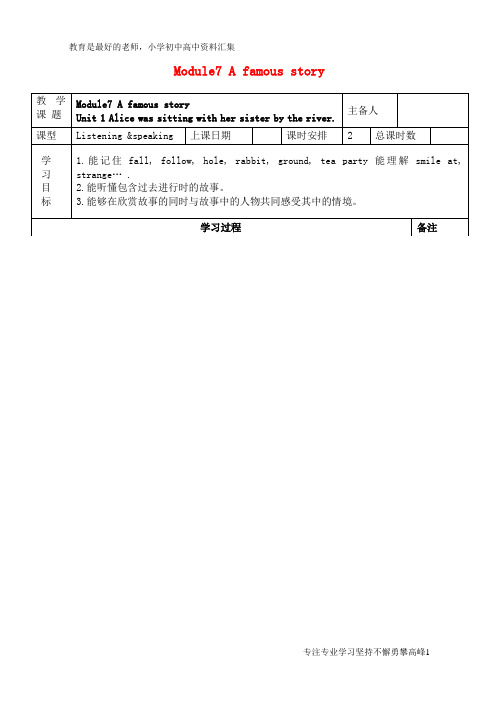
专注专业学习坚持不懈勇攀高峰2
教育是最好的老sten and answer the questions in A3. 1. Why was the rabbit running?________________________________________________ 2.What was the Queen of Heart doing?__________________________________________ VIII. Finish Activity3. IX. Read the conversation and complete the table. Name What was he / she doing? /What were they doing? Alice sitting with her sister by the river. the White Rabbit the Cheshire Cat the Mad Hatter and the March Hare the Queen of Hearts X.Try to retell the story on PPT. 课堂检测 I. Finish Activity4. plete the sentences: 1.那时这个小孩正朝着他的妈妈微笑。 The child ________ _______ ________ his mother at that time. 2.昨天下午 3 点到 5 点一些孩子正在河里游泳。 Some children _______ _______ in the river from 3 to 5 yesterday afternoon. 3.10 分钟前一只白兔从她身旁跑过。 A white rabbit _______ _______ her ten minutes ago. 4.我爸爸昨天的这个时候正在看电视。 My father________ _______ TV at this time yesterday . III.Finish the following tasks. 1. It’s about a girl __________(call) Kate.(用所给词的适当形式填空) 2. She saw a white rabbit _________ a watch.(用介词填空) 3. It was sitting __________ a tree and smiling _________ everyone.(用介词 填空) 4. Alice arrived at the March Hare’s house.(改为同义句) Alice _________ _________ the March Hare’s house. Alice_____________ the March Hare’s house. 5.To see if you remember the story.( 翻 译 成 汉 语)__________________________________ 课后延学 完成下列文章 One day, Alice was ________ with her sister by the river and she saw a white rabbit with a watch. It was________ to see the Queen of Hearts. Alice followed the white rabbit and fell down a _______ in the ground. In the hole, the Cheshire
- 1、下载文档前请自行甄别文档内容的完整性,平台不提供额外的编辑、内容补充、找答案等附加服务。
- 2、"仅部分预览"的文档,不可在线预览部分如存在完整性等问题,可反馈申请退款(可完整预览的文档不适用该条件!)。
- 3、如文档侵犯您的权益,请联系客服反馈,我们会尽快为您处理(人工客服工作时间:9:00-18:30)。
精品K12教育教学资料Module7 A famous storyUnit1 Alice was sitting with her sister by the river. 1. a girl called Alice 2. sit by the river a table of four by the window 靠窗的四人座的桌子 3. a white rabbit with pink eyes a lovely girl with big eyes 4. run past/by (后可接宾语) 5. follow sb./sth. (1) go after …跟着某人 A man is following / going after her. (2) 听从;遵循规则、章程 follow one’s advice/school rules (3)理解 Don’t speak quickly, or I can’t follow you. 6.fall- fell -fallen 跌倒 fall down/into the hole 掉到洞里 fall down from …= fall off …从某地跌倒 昨天她从自行车上跌下来。
She fell down from / fell off the bike yesterday. Look !The fall ing leaves are like butterflies. The ground is covered with fall en leaves. feel- felt-felt 感觉,感到;摸起来 7.注意区分介词 in 和on 1)There is a huge hole in the ground. 2)There is a dog lying on the ground. 3)Please put up the clock on the wall. 4)There are four big windows in the wall of the classroom.教室的墙上有四扇大窗。
5)There are plenty of apples on the tree. 6)My kite is high in the tree. Can you help me? 8. smile at sb. 朝某人微笑 laugh at sb. 嘲笑某人 9.arrive at/in =get to= reach 后接地点 不接地点的时候用arrive They were fighting when we arrived. 10. have/go to a tea party at a party/meeting 11. play a strange game strange= unusual stranger n. 12.Alice’s Adventures in Wonderland 《爱丽丝梦游奇境》 take/have adventures 去冒险 adventure stories 冒险故事 character [ˈkær əkt ə(r)] n. 角色the Mad Hatter 疯帽匠 the March Hare 三月兔the White Rabbit the Cheshire Cat 柴郡猫 the Queen of Hearts 红桃王后 13. if “如果”,引导条件状语从句(主将从现) “是否”,引导宾语从句(陈述句语序) 1) 如果明天不下雨,我去逛街。
If it doesn’t rain, I’ll go shopping. = I’ll go shopping if it isn’t rainy tomorrow. 2) 我想知道今天你是否上班迟到了。
I want to know if you were late for work today. 14. do an interview 做一个采访 15. a place where rabbits live 一个兔子居住的地方 Unit 2 She was thinking about her cat. 1. get tired/bored/excited/frightened(害怕的) 2.have nothing to do 3. once or twice 偶尔;不时的 sooner or later 迟早 If you don’t listen to me, you’ll regret sooner or later.如果你不听我的,迟早会后悔。
4. look into 往…里看;浏览;调查The government promised to look into the matter. 5. what… for =why What do you study hard for ? = Why do you study hard ? 6. a book without pictures or conversations Without air or water, men can’t liv e on Earth. = Men can’t live on Earth without air or water. 7. think of sb./sth.想念某人或某物 think of/about doing sth. think hard 使劲想 think it over 仔细考虑Think twice before you leap.三思而后行。
8. nothing strange 没什么奇怪的事情 someone famous 名人 somewhere warm 暖和的地方 (形容词修饰不定代词,位置放后面) 今天的报纸没什么新内容。
There is nothing new in today’s newspaper. 9.区分 hear/see sb. do sth. 听到或看到某人做了某事全过程或经常做某事 hear /see sb. doing sth. 听到或看到某人正在做某事 类似的动词还有feel/ watch / look at / listento/notice/find1) 我经常听到小鸟在树上唱歌。
I often hear little birds sing in the tree.2) 我爷爷经常看我弹琴。
My grandpa often watches me play the piano. 3) 昨天当我到家时,我看见妈妈在用萝卜喂兔子。
When I got home yesterday, I saw my mum feeding the rabbit with a carrot.4) She heard some kids ______ (sing) when she returned to the school. (singing)5) I saw his wallet _____ (fall) onto the ground. (fall)10.She thought it was strange.(否定句) She didn’t think it was strange.(否定前移)我认为他是不对的。
I don’t think he is right.11. take sth. out of / from… 从…拿出…He took some coins out of/from his pocket quickly. 他快速地从口袋掏出几个硬币。
12.get up 起床;起身13. run across thefield/square/river/road/streetrun through the forest/city/gate/hole注意across 横穿;穿过平面 go across=cross through穿过一个空间run after=chase追赶她正追着那个男人横过马路。
She is running across the road after the man. 一只鸟追着一只蜜蜂从窗子飞出去了。
A bird flew through the window after the bee.15. go down a hole16.It was too dark for her to see anything.太黑了….什么都看不见结构: too +形、副(for sb.) + to do sth. =… enough to do sth.= so/such…that…(句子用否定形式)对动物来说,这水太脏了不能喝。
The water is too dirty for animals to drink =The water is so dirty that animals can’t drink it.这问题对我来说太难回答。
This question is too difficult for me to answer. This question is so difficult that I can’t answer it.这件外套对他来说太大不能穿。
This coat is too large for him to wear. = This coat is so large that he can’t wear it.It is such a large coat that he can’t wear it. 17. She never thought about how she was going to get out again.how 引导的句子作宾语从句时,用陈述句结构。
如:我不知道他在哪里。
I don’t know where he is.转换成 She never thought about how to get out again. how+动词不定式做about的宾语18. think about 考虑(thought- thought)think of 想起,认为What do you think of…?think over 仔细考虑 think it over 考虑再三19. land n. vi.The elephant is the largest land animal.=The elephant is the largest animal on land.The plane landed safely at last.land on some dry leaves 落在一些干树叶上20.with 用She opened the door with the key.He bought himself a suit with his pocket money.21. go off (灯) 熄灭22. call sb. up = ring sb. (up)= telephone/phone/call sb.= give sb. a ring/ phone 给某人打电话23. when和 while的区分延续性动词和瞬间动词:延续性动词指一个可以持续一段时间的动作,比如:work, study, swim, walk, run, wait, stay, sleep 等。
